Get Inspired
Harvard Hockey Goalie Pledges Brain
As part of My Legacy and Brain Pledge Month, I'm encouraging my friends, teammates, and anyone who wants to make a difference alongside me to pledge their brain to support research. My story is below. You can join me and pledge here.
Molly Tissenbaum got in the net for the first time when she was 8 and knew that was where she belonged. Her goal was to play goalie for the Harvard Women’s Ice Hockey team and did whatever it took to get there, including staying silent about a concussion during a playoff game in high school. She felt like a different person for months but eventually found a “new normal” and headed to Cambridge. Before her sophomore year, her family got in a car accident, which forced her to leave school and the ice to allow time to fully recover. Tissenbaum finished out her years playing at Harvard and pledged to donate her brain to the Concussion Legacy Foundation. In this story, she shares the struggles that came with her concussions and why she chose to take the pledge.
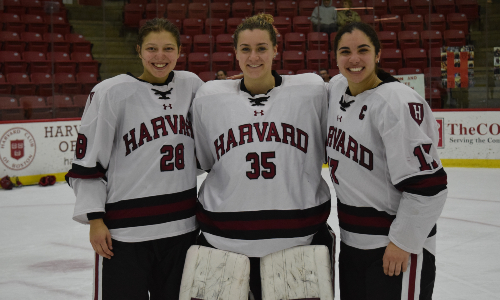
Posted: February 24, 2017
I never thought that at just shy of 23 years old I would have spent so much time thinking about my legacy. And yet as my hockey career ended just four short days ago (at the time of my writing this) I’ve spent a significant amount of time thinking about what my legacy will be. We have a saying in the Harvard Hockey program that our ultimate goal is to leave the jersey better than you found it for those who follow you. I now realize that leaving the jersey better than I found it does not stop with the Harvard Hockey program. It extends into the wider world of sports, and leaving that better than we found it. By telling my story, I hope that I can leave the jersey, and the sport at large, better than I found it.
I was an athlete from before I can actively remember. Everything my older brother did, I wanted to do too. That’s really why I started playing hockey. When I was eight years old I got my first chance to play as a goalie and fell in love with it. The rest, as they say, is history. It became part of my identity, and something that I was proud of. I was a goalie; one of those slightly crazy people who defies human nature and puts herself in the way of fast moving objects. And I loved every second of it.
When I was 13 years old, I suffered my first concussion. I was wearing a junior level mask because it never occurred to my parents or me that I should have been using anything better. I was training on the ice with a group of guys who were a few years older than me when I got hit in the head with an errant slapshot. I always loved the challenge of keeping up with older, faster athletes. The instant that the puck hit me, I knew something wasn’t right. I had been hit in the head before, but this felt different. When my friend and the goalie coach came over to see if I was okay, they discovered that the cage of my mask was dented, and that there was a red welt forming on my right cheek. My friend apologized countless times, asked me if I was okay, and in true athlete form, my response to his question was, “Where’s the puck? Did it go in the net?” Once they assured me that no, the puck had not gone in the net, I left the ice and called my mom. She came and picked me up from school, and took me home. I remember sitting with an ice pack on my face and head to try to keep the bruising at bay. I was home from school for about a week, and when my symptoms cleared, I went back to school, and within 2 weeks I was back on the ice without symptoms. I was young, it was my first concussion, and I was incredibly lucky to heal so quickly.
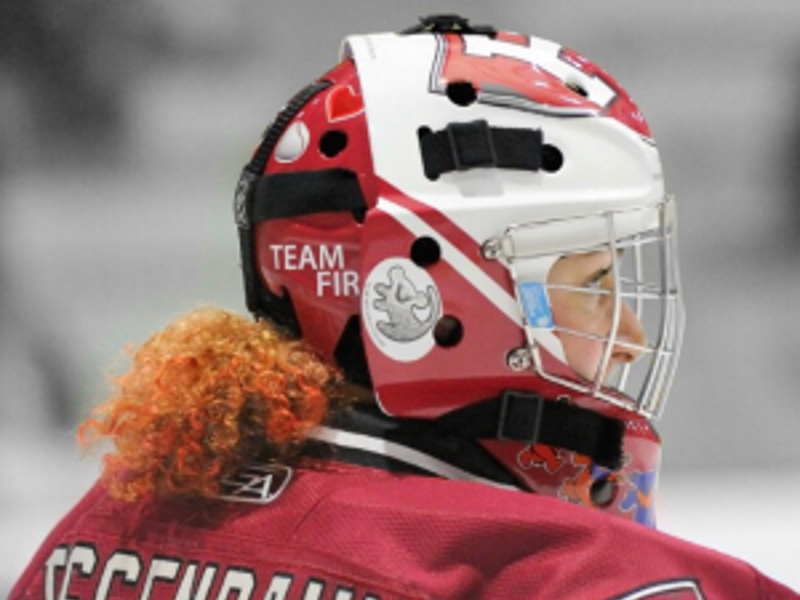
The second time I suffered a concussion was in a playoff game when I was 15. In the second period of a 0-0 tie against a team we were expected to lose handedly to, I got hit in the head with a stick across the left side of my head. I was in a butterfly (on my knees to cover the bottom of the net), when a puck was flipped in the air towards me. The girl on the opposing team took a swing to try and bat it out of the air and missed, but made clear contact with me. Having suffered a concussion at 13, I knew immediately that I was not okay. I remember looking up to see who hit me and struggling to determine if the number was 13 or 31. The numbers looked like they were dancing.
But it was only the second period, and we had to win this game in order to advance to the provincial championship tournament. My competitive instincts took over and told me that I shouldn’t say anything. If I told the coach that I wasn’t okay, they would take me out and we might lose the game. I couldn’t do that. So I finished that game. We ended up winning that game, although I can’t remember it, and advancing to the championship tournament. I remained silent. I only had 2 weeks until that tournament. I was a leader. I was the starting goalie. My team needed me, so I had to be tough. I had to suck it up for the team’s sake. At no point did it occur to my 15-year-old self that I might be hurting myself, or even the team, by playing through a concussion.
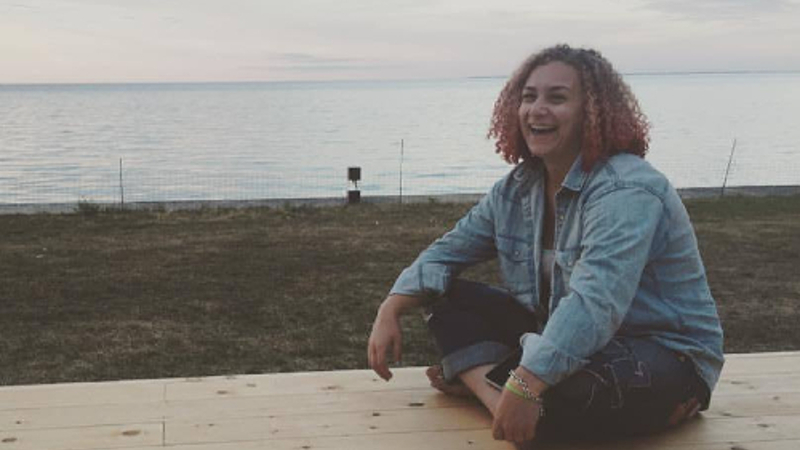
The decision to play through it was one that I suffered the consequences for. For almost six months following that decision, I was a different person. I was a shell of the chatty, competitive, smart, outgoing teenager those around me had come to know. My friends noticed that I wasn’t smiling as much. My teachers noticed that the quality of my work had dropped significantly. My family noticed that I was different, but none of us knew why. We know now. It was most obvious that I was still suffering in my math class. I went from being in the top of my class to having my teacher tear up an exam because he knew there was something wrong because I had done so poorly. And it lingered after freshman year of high school had finished. In September of my sophomore year in the review of what we had learned the previous year, I had absolutely no recollection of learning certain concepts. I had to go back and learn them from scratch while my classmates went ahead and built on the concepts they had already mastered. My decision to try and play through this concussion impacted not only me, but everyone around me for many months.
And yet eventually I healed and found my new normal. Anyone who has suffered a concussion knows that healing means finding a new normal. It’s a new version of 100%, but it's not the same as who or what you were before. It can’t possibly be. But that doesn’t mean the story has to end. Mine certainly didn’t. My new normal was good enough to be the class valedictorian in high school, get me into Harvard, and onto the Harvard Hockey team.
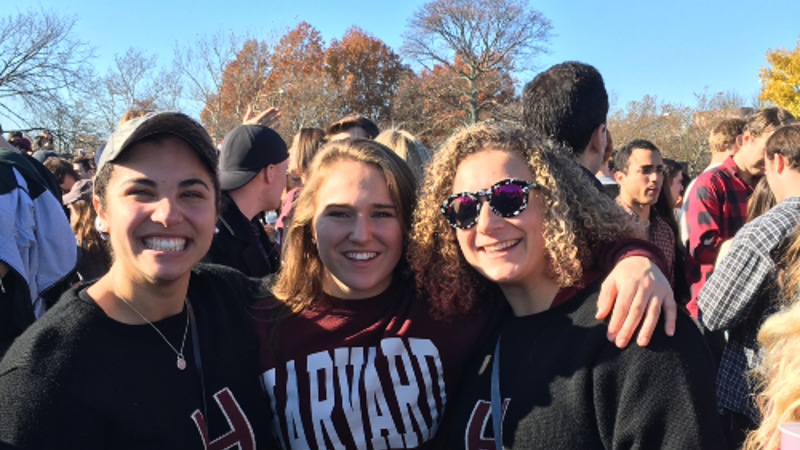
On move in weekend of what should have been my sophomore year in college, my parents and I were involved in a serious car crash. We had stopped at a red light, and I was on the phone with my aunt making plans to see them for dinner when we were finished unpacking, when I saw the light turn green. My dad, who was driving, pulled out into the intersection, preparing to make a left turn. There were three lanes of traffic before the turn lane we were in. I remember looking out the window of the back passenger seat and seeing the dark color Jeep speeding at us. I tried to say something to warn my parents, but nothing came out of my mouth. The impact of the car was unlike anything I had experienced, despite having been run over more than once in my hockey career. Our car tipped up onto its side and came back down onto the road; airbags were deployed, the front passenger door was dented beyond recognition, and the front driver tire was parallel to the ground.
In the chaos of my parents both whipping around from the front seat to make sure that I was okay, and telling me I had to get out of the car immediately, I remember thinking to myself, “My hockey career is over. I won’t recover from this”. The flurry of activity that followed included a neck brace, being taped to a backboard, the trip in an ambulance, and a brief visit to the pediatrics unit of a local hospital. My memory of the weeks that follow is spotty at best. I remember watching my team do fitness testing because the trainer knew I had been in a serious car accident and didn’t want me to participate. I remember feeling like I was going to fall off the bridge and into the Charles River walking from my dorm to the rink to watch fitness testing. I remember not being able to leave my room without a baseball hat and my dark sports sunglasses on. I remember the pounding headache, the sensitivity to sound and light, and feeling like my world was closing in on me. On a continuous loop in my head I heard the screeching of the tires, saw the look of terror in the faces of my parents, and couldn’t escape the feeling of the impact against my body that had certainly spelled the end of my career.
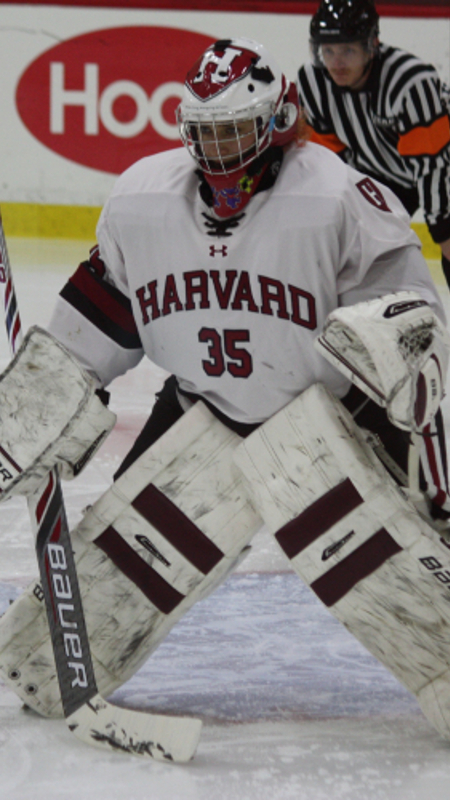
A few weeks after the car accident, I met with my academic advisor because I still couldn’t go to classes. She kept the blinds drawn to keep the sunlight out of the room for me. I remember her telling me that if I had done something stupid and wound up concussed that the college might not be so open to preserving my eligibility. Ultimately, she advised that I take a medical leave of absence and go home to give my brain some time to heal. In the third week of September, I packed a suitcase and I flew home for the year.
The next few months were some of the worst in my life. Not only was I suffering from the symptoms of a concussion, but I was now isolated from my teammates and my friends at school. I truly felt like my life had been taken from me, and there was nothing I could do about it. I couldn’t get angry, because that would raise my blood pressure and make my headache worse. I definitely couldn’t cry because that would make the pressure in my head even more unbearable. I couldn’t escape into a book, as I usually did when I was sad, because I couldn't focus or comprehend what was in front of me. I watched Gossip Girl. There were no explosions or loud noises and the plot was easy to follow. As a self-proclaimed bookworm who loves music, it was particularly hard to be happy because I was unable to do all the things that I loved the most. I couldn’t play hockey, I couldn’t read, and I couldn’t listen to the music I liked.
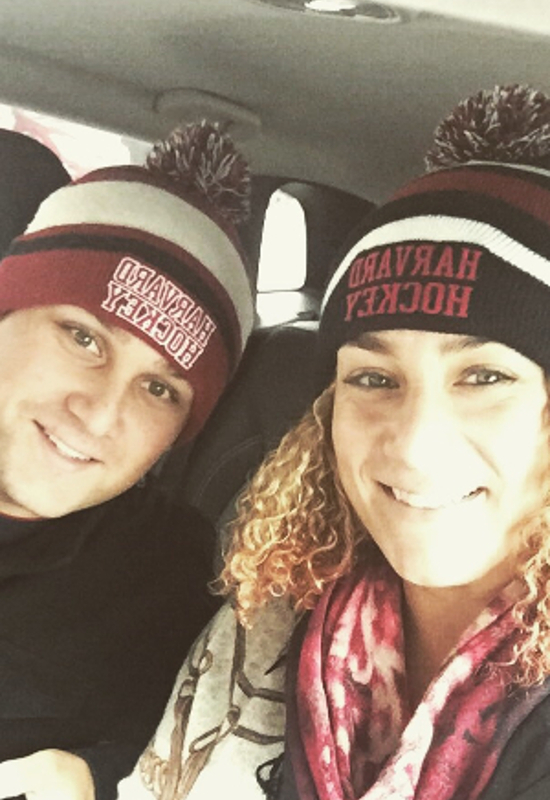
Somehow I recovered from this too. It’s truly amazing how resilient the body can be. I worked with no fewer than three therapists to get the concussion symptoms under control, to manage the neck and back pain, and to help me regain the mobility I had lost from sitting on the couch for months at a time. Once again, I had to find a new definition of normal. I could move without serious back and neck pain. The headaches eventually went away. The sensitivity to sound eventually subsided. I began to be able to walk for 15 minutes without feeling sick, then 30 minutes, then bike and workout. Slowly but surely I started to feel like myself again. I had a new normal, and it was just fine with me. In late March I got a job, and I was finally seeing the light. Maybe I wouldn’t be exactly how I was before, but I’d be damn close, and I wouldn’t stop trying to get back everything I felt I had lost.
I am now a second semester senior in college. I played four years on the varsity women’s hockey team. I still get headaches when the weather changes, and I am still sensitive to light, I still have neck pain and I have jaw problems that I wasn’t aware I had from the accident. My new normal is about to get me to graduate from college and start the next journey of my life, but not before I do some serious thinking about how to leave my sport better than I found it.
Suck it up. Play through it. Walk it off. These are the statements that float around constantly in the mind of the competitive athlete. The culture that we’ve created that surrounds sports doesn’t allow for any other thinking. It endorses the idea that no one and nothing is more important than the team, and helping the team win. I’ve had to learn the hard way that this simply isn’t true. The health and protection of our brains is more important than any game.
There is a fine line between giving up everything you are, and everything you hope to be, in order to avoid being labeled soft or told you’ve let your team down. I do not believe that anytime an athlete gets hangnail that he or she should be excused from competition. Quite the opposite actually. I’ve learned a lot about the strength of the human body and the strength of a team, by playing through a broken finger, a sore arm, gimpy knees among other things. But the visible injuries are the easy ones. Your teammates see you limping, see your finger bent backwards, see the slings and casts, they see the blood you’ve shed for them. The seemingly invisible injuries are the dangerous ones. Outwardly there’s very little evidence. No sling. No cast. No limp. But the functional trauma is real, and doesn’t get the attention and support that it should.
I’ve decided to join the Concussion Legacy Foundation and pledge to donate my brain because I want my story to help inspire others to take better care of their brains. I don’t want to watch any more of my teammates suffer in silence because they are afraid to speak up about their concussions in fear of lost playing time, or worse, for fear of being labeled soft or selfish. As athletes, it is our responsibility to have our teammates’ backs in competition, but we’ve fallen down on our responsibility to look out for each other’s brain health. The culture of playing through concussions needs to stop. I want to give back to the game that brought me so much joy.
My legacy will not be in the number of saves I made, or the number of games I won. I hope that my legacy will be in finding a way to leave the game I love better, safer, and healthier than I found it.
This is my legacy. I hope that you’ll make it your legacy too.
You May Also Like
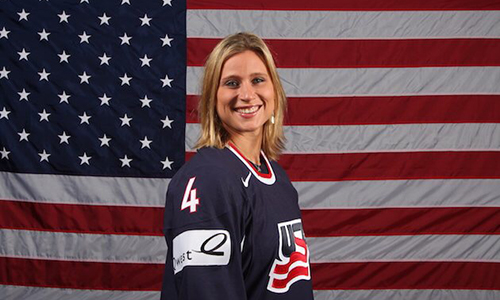
Hockey Hall of Famer and 4-time U.S. Olympian Angela Ruggiero wants to be an inspiration for female athletes to participate in concussion and CTE research.
Watch: Ruggiero on her legacy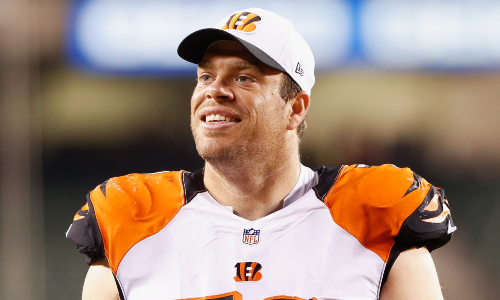
Former NFL player and NFLPA President Eric Winston took the #MyLegacyPledge to help the next generation of athletes.
Eric Winston on his legacy